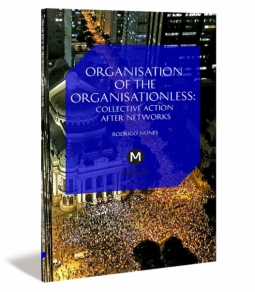Organisation of the Organisationless: Collective Action After Networks
By Rodrigo Nunes
Series editors: Clemens Apprich, Josephine Berry Slater, Anthony Iles & Oliver Lerone Schultz.
Rejecting the dichotomy of centralism and horizontalism that has deeply marked millennial politics, Rodrigo Nunes’ close analysis of network systems demonstrates how organising within contemporary social and political movements exists somewhere between – or beyond – the two. Rather than the party or chaos, the one or the multitude, he discovers a ‘bestiary’ of hybrid organisational forms and practices that render such disjunctives false. The resulting picture shows how social and technical networks can and do facilitate strategic action and fluid distributions of power at the same time. It is by developing the strategic potentials that are already immanent to networks, he argues, that contemporary solutions to the question of organisation can be developed.
Buy on Amazon UK £4.25 and other regions, Super Saving free shipping.
Part of the PML Books series. A collaboration between Mute and the Post-Media Lab
Rodrigo Nunes is a lecturer in modern and contemporary philosophy at the Catholic University of Rio de Janeiro (PUC-Rio), Brazil. He coordinates the research group Materialismos (http://materialismos.tk), which investigates the resurgence of metaphysical speculation in contemporary philosophy and its interfaces with other fields such as politics, science and anthropology. He has been involved in several political initiatives over the years, such as the first editions of the World Social Forum and the Justice for Cleaners campaign in London. He is a member of the editorial collective of Turbulence (http://turbulence.org.uk).
Rodrigo Nunes is a co-editor of What Would it Mean to Win?, Turbulence Collective (Eds.), PM Press, 2010
Reviews of What Would it Mean to Win?
‘Powerful vision of the possible and the seldom-seen present.’
—Rebecca Solnit, author, Hope in the Dark and A Paradise Built in Hell
‘This kind of innovative thinking, which emerges from the context of the movements, opens new paths for rebellion and the creation of real social alternatives.’
—Michael Hardt, co-author, Commonwealth, Multitude and Empire
(2014. ISBN 978-1-906496-75-3; eBook ISBN 978-1-906496-82-1)









